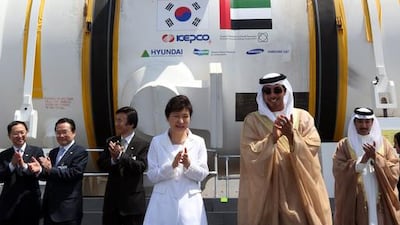ABU DHABI // The UAE’s first nuclear reactor vessel arrived on Tuesday.
Sheikh Mansour bin Zayed, Deputy Prime Minister and Minister of Presidential Affairs, and the South Korean president, Park Geun-hye, attended a ceremony to mark the arrival of the vessel in Barakah, the site of the UAE’s nuclear energy plants in the Western Region.
Sheikh Mansour expressed his delight over the milestone, and described the arrival of the pressure vessel as “an important achievement that bears the best testimony to the strong relationship between the two countries and their fruitful cooperation in making this project a success in accordance with the highest standards of quality”, said the state news agency, Wam.
The reactor vessel is one of the most important features and largest components in a nuclear energy plant. Inside the vessel, controlled nuclear reactions occur that release energy that will generate electricity. It is also one of the many defence-in-depth barriers that ensure the safety of nuclear energy plants.
“Peaceful nuclear energy plays a significant role in the future of our nation as these plants will provide us with electricity which we need to fulfil our needs,” said Sheikh Mansour.
In 2009, the Emirates Nuclear Energy Corporation awarded the prime contract to construct the UAE’s nuclear energy plants to a consortium led by the Korean Electric Power Company (Kepco), one of the world leaders in safety, plant reliability and efficiency. Significant progress on the construction of the plants has been achieved, with works for Units 1 and 2 now more than 44 per cent complete.
During the visit, Sheikh Mansour and President Park Geun-hye witnessed the signing of three strategic agreements on nuclear energy cooperation.
The first agreement was signed between Enec and the South Korean Ministry of Trade, Industry and Energy, for cooperation in developing a direct employment programme in nuclear energy for graduates from Korea.
The second was among Enec, Kepco and the South Korea Nuclear Association for International Cooperation, and will allow for the development of internship programmes and job opportunities in the nuclear-energy sector for students of both nations. The third agreement will see the partners work towards the development of a plant services industry in the UAE.
Unit 1 is scheduled to enter commercial operations in 2017, and Unit 2 is scheduled for operations in 2018. Enec will apply for an operating licence for Units 1 and 2 in 2015. Barakah Units 3 and 4 are expected to enter commercial operations in 2019 and 2020.
Nuclear energy will deliver up to a quarter of the UAE’s electricity needs, while saving up to 12 million tonnes of greenhouse gas emissions annually.
newsdesk@thenational.ae

